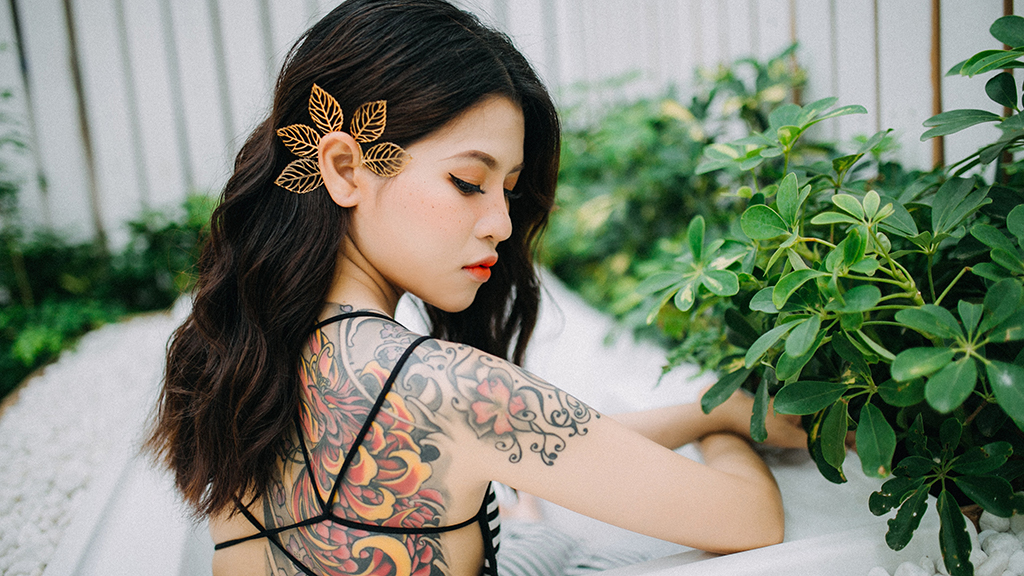A few months before the Rugby Worldcup in Japan, tourists have been looking for places “open” to people with tattoos. But how is it in reality to be a woman with a tattoo in a country where tattoo is taboo?
It’s 8pm in Tokyo, time for Yuriko to get ready for her last boxing lesson before summer break. In the changing room, she’s being careful as she has been for the whole year. She is checking if there are people around, if they are looking at her. Yuriko is not really shy, but she has on her body something that is not really good in Japan, something she has to hide. Yuriko has a tattoo. Not a large one, but it could be enough to get her excluded from the boxing club here in Japan, and from many other sport and public facilities.
Yuriko comes from Shiga, a city close to Kyoto. She got interested in getting a tattoo after seeing one of her friends getting one. “I found that tattoo beautiful and it seemed really cool to have something different, showing who I am, “she says. When she turned 18, she started thinking about it more seriously, this was an important reflection since she knew how big of a deal it is to get a tattoo here in Japan.
She finally made her decision and she got a tattoo. But on her inner thigh, a place easy to hide. Yuriko chose to get a small butterfly with a lily flower, about seven square centimetres. The butterfly and that flower in particular have a meaning for Yuriko, “a flying living being that never stays at the same place, it’s a bit like me, I don’t like to stay at the same place, the lily flower because my name means lily child and this is my favourite flower” says Yuriko.
I had to use stickers provided by the reception to cover my tattoos
Yuriko
Gyms, onsen, ryokan or even some beaches. All those places may sometimes be forbidden to tattooed people and Yuriko has experienced this ban more than once. “A few times when I went to onsen with my friends I had to use stickers provided by the reception to cover my tattoos” says Yuriko. She also remembers another time when she went to the swimming pool with her family, that day a staff member approached her and ask her to hide her tattoo. If not, Yuriko would have had to leave. At the beach as well, she remembers once going to Suwa beach, in Hyogo prefecture, where tattoos are not allowed. “There were many signs saying that tattoos were forbidden and quite a few times, the people working on the beach asked me to hide my tattoos” she says.
Yuriko’s tattoo is already a problem but what about a bigger piece? “One of my friend has a large tattoo on her back, she only goes to private Onsen and gyms where tattoos are not a problem. It is a big deal for her and there are many things she can’t do” Yuriko says. Even in places such as Gold’s Gym, an international chain, tattooed people will often be asked to leave or cover their tattoo if they are small enough.

Staff from public places will usually ask you to leave or cover your tattoo, however the reaction from people can be different. “Japan is fundamentally a non-confrontational country” says Hilary Keyes, a Canadian writer who graduated in anthropology and Japanese studies, and who has been living in Japan for thirteen years now. She explains that except for staff or authorities, people will “tend not to make a scene about something they are uncomfortable or bothered by” and they finally will be more likely “to avoid physical closeness or look disdainful” both with foreigners and Japanese. With nearly 40 tattoos Hilary can tell about the situation. When she arrived in Japan she had only 2 or 3 tattoos and she was fully aware of how life would be here.
Public places are not the only places where tattooed people are usually being careful to not show their tattoo. Even in a more private sphere, Yuriko used to be way more careful. Her parents might not appreciate at all their daughter having a tattoo. For instance, Yuriko never told her dad about her tattoo. He found out later when she was 23. “I forgot to hide it once when I was home and he saw it. Fortunately he didn’t say anything, but he was really disappointed” she says. Her friend with the large tattoo in the back is experiencing the same thing and is still hiding her tattoo from her family.
Back to the boxing class. Yuriko is moving from right to left, left to right, working on her footwork. Listening to the coach’s advice. Dodging when the opponent’s punch is coming toward her face. She has attached her hair and she’s wearing a long blue tracksuit that covers totally her legs. She does not want anybody to spot her tattoo. “This is in the club’s regulations, if anybody sees a tattoo I have to resign from the club” she says, and this is why she is being so careful, “I think that if some people from the club spot my tattoo they would denounce me”. Even during the class, she tries her best to hide her tattoo, she has to constantly hide it from the coach and the other members.

Even with a nearly invisible tattoo, it can be difficult to make your way in Japanese society. In 2012, The Japan Times reported that the Osaka authorities, led by former mayor Toru Hashimoto, launched an investigation to check if civil workers had a tattoo. Respondents were asked to fill a form saying if they had a tattoo on visible parts or the body like hands or arms but also on any other non-visible place of their body. Despite a first ruling confirming the discrimination the civil workers were fighting against, a higher court denied the discriminative aspect of this decision. Later, in 2014, The Telegraph reported a similar case in Osaka. This is how important the matter of tattooing is in Japanese society, but this also shows how taboo and controversial it has become over the last few years.
Japan is kind of late on woman’s rights
Yuriko
If tattoos are an issue in Japan, they seem to have an even worse impact on women. This could highlight a deeper gender equality problem in a society that sometimes seems to be torn between traditions and modernity. “Japan is kind of late on woman’s rights,” says Yuriko. A point of view shared with Hilary Keyes, “tattoo is a bigger problem for women”, she says, and “it’s mostly because Japan is behind in term of women’s rights compared to other G7/8 countries for instance”.
This rejection of tattoos on women comes from the traditional Japanese vision of the woman who is supposed to be “the nice housewife taking care of the children and the house for instance” says Yuriko. But this vision seems to be a question of generation with younger girls sometime willing to prioritise their career over the family. Hilary Keyes says that when she used to teach English in Japan she “overheard mothers telling their daughters that growing up to be a mommy and a housewife was the goal”.
If you have a tattoo […] you look like a slut.
Hilary Keyes
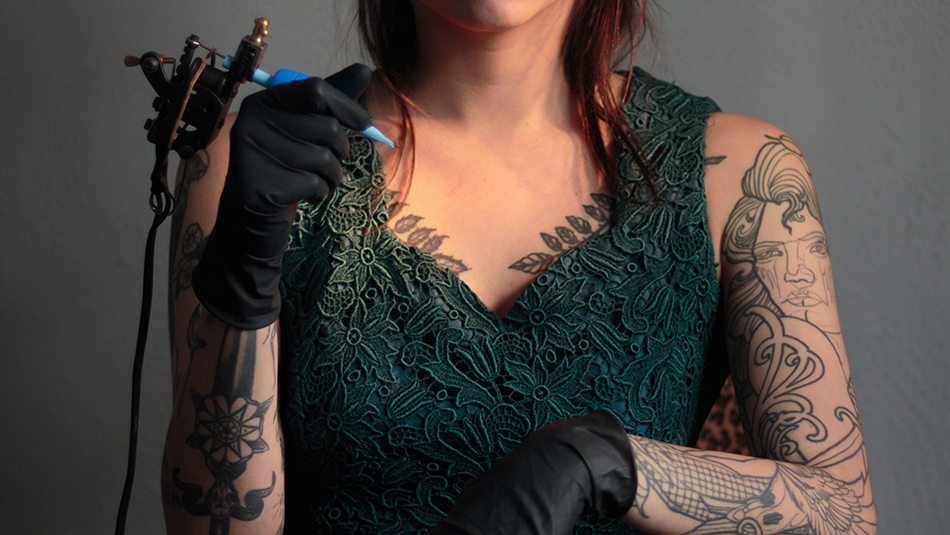
Tattoos then is like a spanner in the work. It makes you step out of the pre-drawn pathway, either for a Japanese or a foreigner woman and then you are “not fulfilling the demure” says Hilary. She goes further saying that for some people in Japan women with tattoos may look “dangerous or otherwise not easily controlled by man” meaning they are not “housewife material”. Then, you are not good enough of a woman to get married and have children. “Technically speaking” you look like “a slut” for those people says Hilary.
However, this situation seems to be changing with the new generation. “More and more guys seem to treat women like in European countries” says Yuriko, “being careful, taking care of children”. This feels like the Japanese society has been slightly changing over the last few years. From Hilary Keyes observation, women in Japan have now “more freedom to choose” and the younger women that are getting married “often are more independent and keep their career”. She even heard from some women that they didn’t want to become this kind of traditional housewives because they used to see how unhappy their mother used to be.
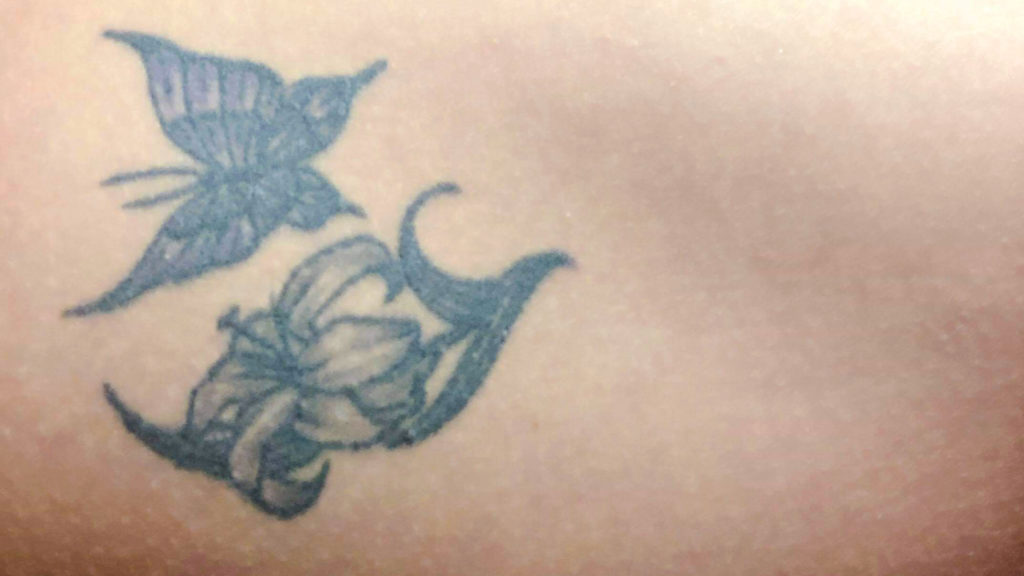
A problem that Yuriko has not faced that much for now and probably won’t. “My tattoo wasn’t a problem when I was dating Japanese guys because it’s not very visible” she says, and now Yuriko is married to a French man who is used to a different tattoo culture. Hilary confirms by saying she has met a few tattooed Japanese women who had issues with dating in Japanese society but it is still “very rare”. In Japan, according to Hilary, as long as a woman is not heavily tattooed she might not let anyone know about her tattoos. Furthermore, as Hilary explains, Japanese women might get only small tattoos on a part of the body that will rarely be seen outside the private sphere or onsen, a theory confirmed by Yuriko’s tattoo.
That perception of a woman with tattoos will be the same in guy’s mind “either for a Japanese girl or a Western girl” explains Hilary. “It all depends on attraction at that point” she says. And if a Japanese man is attracted by a tattooed girl, often the reluctant part would not actually be because of the woman’s tattoos but more about “the gossip” and “what people think of her”. Indirectly it becomes more about his own image than his girlfriend or wife, and again it comes back to this refusal to step out of the mass and of the norm of Japanese society.
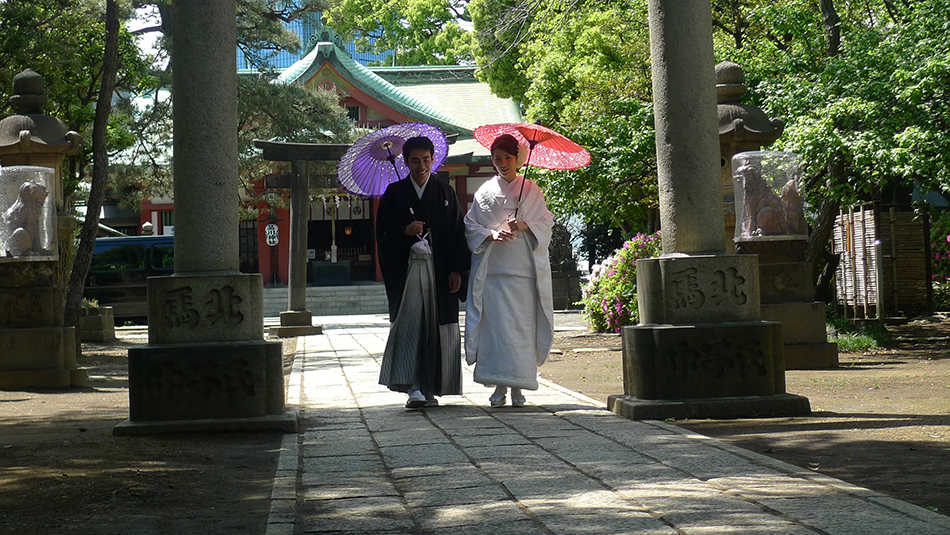
This social issue with tattooing, however, does not seem not to impact women’s professional life more than men. Hilary explains that most of the people working in normal or traditional companies are actually not the kind of people to have a tattoo in the first place. “In Japanese society” she says, “everyone in a traditional office-type job is meant to do their work and follow protocol”. To Hilary, the gap between work life and professional life is huge in Japan and everything “that could cause problems between the two are generally avoided”. This means following the dress-code and match the company standards so this would mean the same thing for both men and women.
As a freelancer and foreigner, Hilary explains that this is more a question of common sense and that, even for her, in a meeting with more traditional Japanese people for instance, she would cover up her tattoos. “For a lot of Japanese people” she says, “you make yourself fit in when you need to and be yourself when you don’t”.
A change has been expected for a few years now since the awarding of the 2019 Rugby Worldcup and the 2020 Olympics but Yuriko doesn’t seem to have much hope about it. Not in such a short term… even though she noticed an evolution. “I never met people who said that was bad to have tattoos” she says, “and I feel like most of the people say they actually want a tattoo as well”. An evolution mostly observed amongst the younger generation according to Hilary who makes a connexion with other issues such as LGBTQ+ or climate change.
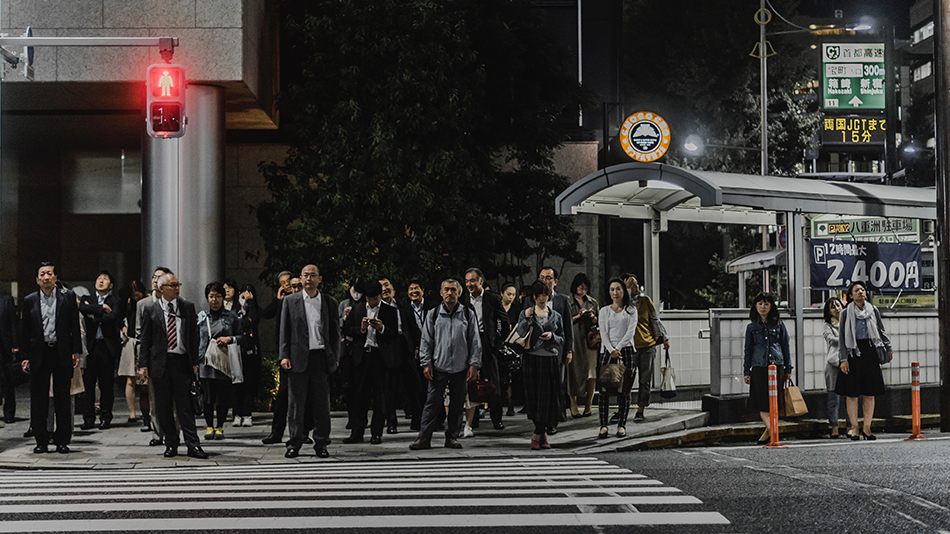
“It’s very much like situations all over the world, the younger generation are moving ahead and thinking their own way while their parents’ generation is clinging to what has always been done” she says. Hilary goes deeper in this explanation by saying that the parents’ generation, the baby boomer generation, kind of wants to keep “themselves the control of things”. A situation of control made easier, on an anthropological point of view, by the fact this generation had less children than their own parents according to Hilary.
At the end of the boxing class, Yuriko is back to the changing room and getting ready to leave. As usual, she will take a shower at home, let’s say this is a safer option for her. After the summer break, Yuriko will get back to her boxing class routine, hiding her tattoo when changing clothes and during the class. The Rugby Worldcup will be close at that point and it might be beneficial to the tattooing in Japan. Whatever happens, it will not stop Yuriko. She wants another tattoo, a second tattoo to cover an old scar, more visible that time.
